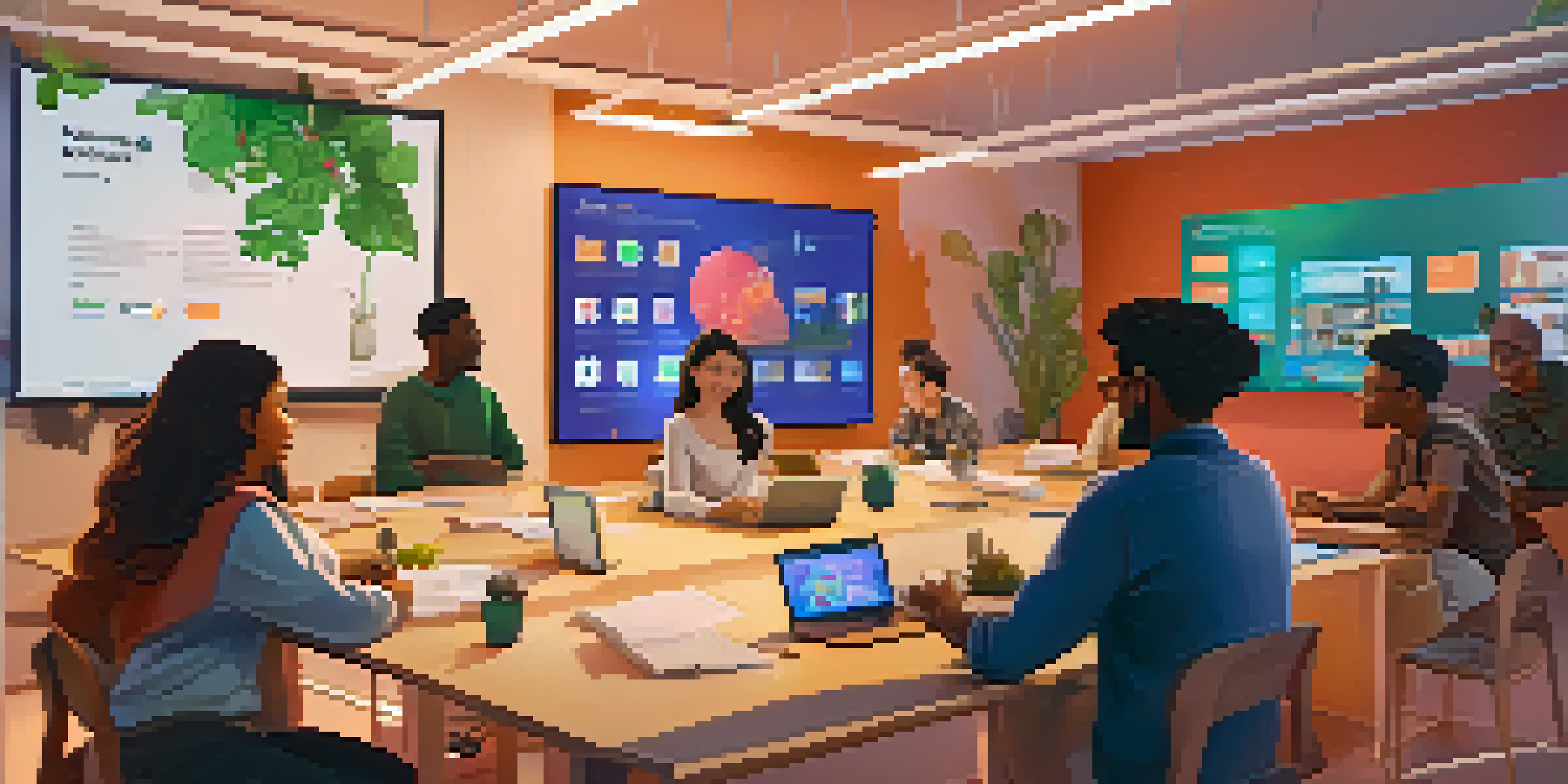The Impact of Social Media on Online Learning Communities

Understanding Online Learning Communities
Online learning communities are virtual spaces where learners connect, collaborate, and share knowledge. These communities can take many forms, from discussion forums to social media groups, all designed to enhance the learning experience. They provide a platform for students to ask questions, exchange ideas, and support one another, making education more interactive and engaging.
The greatest gift of education is the ability to think for yourself.
The core of these communities lies in their ability to foster communication among learners, educators, and industry professionals. By bringing together diverse perspectives, they create a rich tapestry of knowledge that can benefit all participants. This dynamic environment encourages collaboration and innovation, enhancing the overall learning process.
Social media has revolutionized how these communities operate, making it easier than ever for people to connect across geographical boundaries. With just a few clicks, learners can engage in discussions and share resources, creating a sense of belonging that is vital for motivation and success in online education.
The Role of Social Media in Enhancing Engagement
Social media platforms like Facebook, Twitter, and LinkedIn have become essential tools for enhancing learner engagement. They offer interactive features such as polls, live chats, and multimedia sharing that keep learners invested in their education. This level of engagement is crucial, as it can significantly influence a learner's commitment and success.

For instance, educators can create dedicated groups for their courses, allowing students to interact more freely outside of formal class settings. This informal interaction can break down barriers, making it easier for students to ask questions or share insights. The result is a more vibrant learning environment that encourages active participation.
Social Media Boosts Learning Engagement
Social media platforms enhance learner engagement through interactive features that foster communication and collaboration.
Moreover, social media can help learners stay up-to-date with industry trends and developments. By following relevant pages or joining professional groups, learners can access a wealth of information that enhances their educational journey and prepares them for future career opportunities.
Building Connections Through Social Media
One of the most significant advantages of social media is its ability to connect learners worldwide. In traditional settings, students might only interact with peers in their immediate vicinity, but social media expands that network exponentially. This global perspective enriches discussions and fosters a deeper understanding of various cultures and viewpoints.
Education is not the filling of a pail, but the lighting of a fire.
For example, a student in the United States can collaborate with peers in Europe or Asia on a project, gaining insights that they might not encounter otherwise. These connections can lead to long-lasting relationships and even collaborative work opportunities in the future. The shared experiences and knowledge can be immensely beneficial for all involved.
Additionally, these connections often extend beyond the classroom. Learners can network with industry professionals, gaining mentorship and advice that can guide their career paths. This aspect of social media makes it a powerful tool not just for learning but for personal and professional growth as well.
Challenges of Social Media in Learning Communities
Despite its many advantages, social media also presents challenges for online learning communities. One major concern is the potential for distraction, as learners may find it difficult to focus amidst the constant barrage of notifications and updates. This can hinder their ability to absorb information effectively.
Moreover, the informal nature of social media can lead to misinformation. With so much content being shared, it can be challenging for learners to discern credible sources from unreliable ones. This issue emphasizes the importance of teaching digital literacy skills to help learners navigate these platforms responsibly.
Global Connections Enrich Learning
Social media allows learners to connect with peers worldwide, broadening their perspectives and fostering valuable relationships.
Finally, there are issues related to privacy and security. Social media often requires sharing personal information, which can be a concern for some users. It's essential for both educators and learners to understand privacy settings and best practices to protect their information while engaging in these communities.
The Importance of Digital Literacy
Digital literacy is an essential skill in today's online learning landscape, particularly when it comes to navigating social media. It involves understanding how to locate, evaluate, and use information effectively. As learners engage with various platforms, being digitally literate helps them make informed decisions about the content they consume and share.
For example, when participating in discussions on social media, learners should be able to assess the credibility of sources. This skill not only enhances their learning experience but also prepares them for real-world scenarios where critical thinking is vital. By fostering digital literacy, educators can empower learners to become more adept at using social media constructively.
Furthermore, digital literacy also includes understanding the ethical implications of online interactions. Learners should be aware of how their contributions can impact others and the importance of respectful communication. This awareness cultivates a positive online community that is conducive to learning and collaboration.
Social Media as a Resource for Learning
Social media isn't just a platform for interaction; it can also serve as a valuable resource for learning. Many educators and institutions use social media to share articles, tutorials, and other educational materials. This makes it easier for learners to access diverse resources that can complement their studies.
For instance, platforms like YouTube host countless educational channels where instructors break down complex topics into digestible formats. Additionally, sites like Twitter often feature trending discussions that can provide insights into current events or innovations in various fields. These resources can be tapped into at any time, making learning more flexible and personalized.
Digital Literacy is Crucial Today
Developing digital literacy helps learners navigate social media responsibly, ensuring they assess information credibility and communicate ethically.
Moreover, social media allows learners to share their own findings and insights, contributing to a collective body of knowledge. This collaborative aspect not only enriches the learning experience but also encourages learners to take ownership of their educational journeys.
The Future of Social Media in Education
As technology continues to evolve, the role of social media in education is likely to expand even further. Emerging platforms and tools are being developed to enhance online learning experiences, making them more interactive and engaging. This evolution presents exciting possibilities for how learners connect and collaborate.
For instance, virtual reality and augmented reality are starting to make their way into online education, providing immersive experiences that traditional social media cannot offer. Imagine attending a virtual classroom with students from around the world, all while interacting in real-time. Such innovations could redefine what it means to learn online.

However, with these advancements come new challenges. Educators will need to adapt their teaching methods and ensure that learners are equipped with the necessary skills to navigate these tools effectively. The future of education will likely require a balance of technology, pedagogy, and social interaction, making it essential to understand the ongoing impact of social media in learning communities.